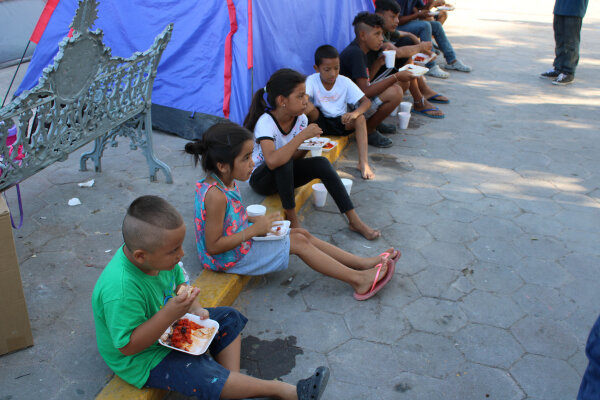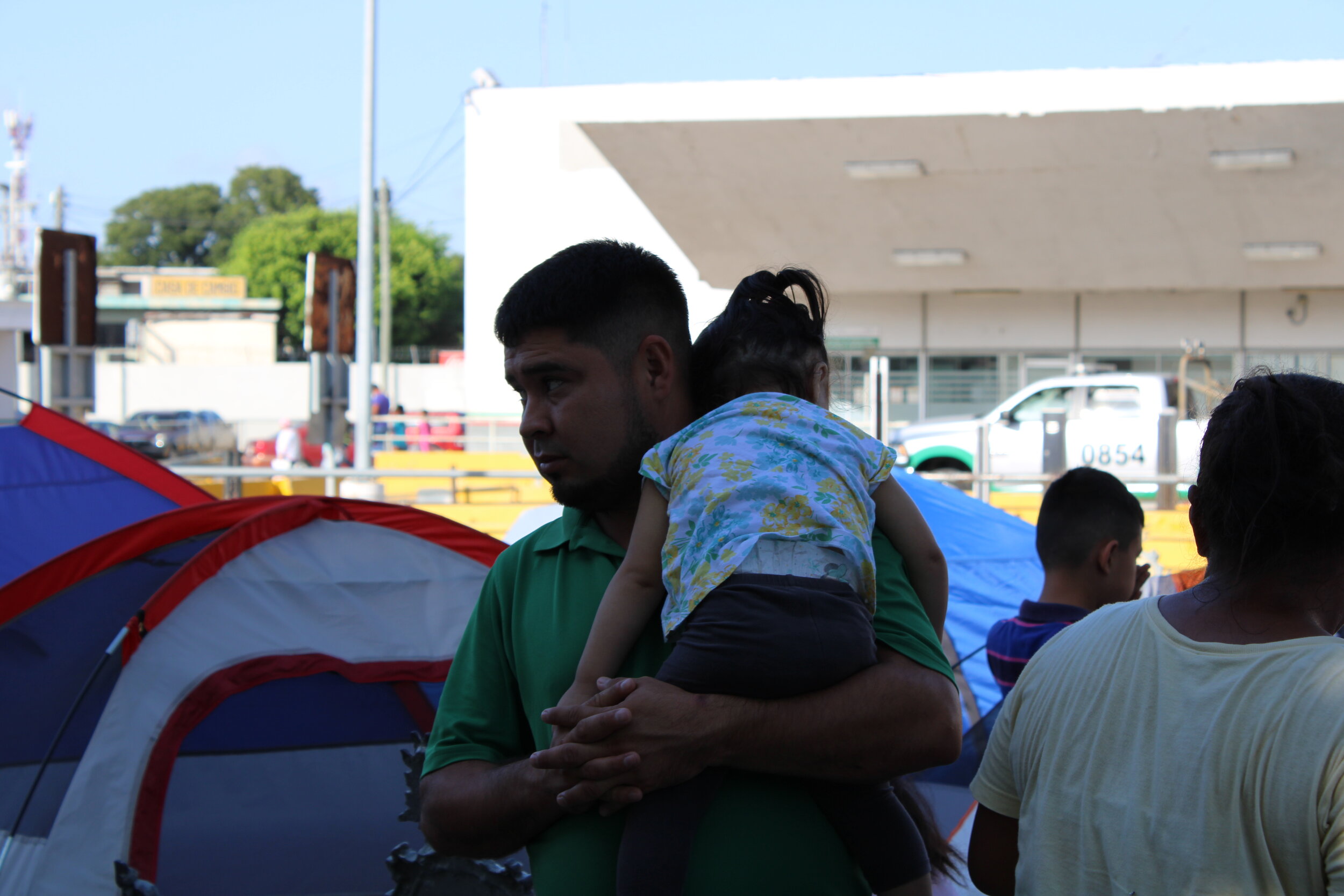Stories to inspire, challenge and educate.
Celebrating Three Kings Day in Matamoros
On Thursday, January 6, hundreds of refugee families along the U.S.-Mexico border, in Matamoros, Mexico received gifts and supplies in celebration of Epiphany or Three Kings Day, a significant Hispanic holiday, thanks to the effort of many Fellowship Southwest’s partner churches and organizations. The goods were distributed in the Esperanza (Hope) and Corazón (Heart) migrant shelters, and in a slum in Playa Bagdad (Baghdad Beach) – on the Gulf coast 25 miles from Gateway International Bridge between Brownsville and Matamoros– where hundreds of Hispanic and Haitian refugees have relocated.
An MPP that might actually protect migrants
Mexico is in the process of implementing its own migrant protection protocol (MPP). But do not worry. This new plan has nothing in common with the recently relaunched U.S. policy, better known as “Remain in Mexico,” which does not actually protect migrants at all.
On the contrary, this MPP is an agreement between various churches, denominations, civil organizations and three levels of Mexican government to holistically address the needs of migrants in the state of Sonora, Mexico, across the border from Arizona.
In Matamoros, Christians’ hearts expand to love Haitian refugees
Thousands of Haitian migrants are stranded in northern Mexico following the largest mass-expulsion of migrants by the U.S. government, in Del Rio, Texas.
Many of the deported Haitian migrants relocated to Matamoros, Mexico—across the Rio Grande from Brownsville, Texas—waiting for a chance to enter the United States officially.
FSW partner Primera Iglesia Bautista in Piedras Negras mobilizes to aid Haitian migrants
Pastor Israel Rodríguez-Segura received shock after shock when he heard the news about 15,000 migrants, mostly Haitians, camping under the international bridge between Ciudad Acuña, Mexico, and Del Rio, Texas. The number of migrants shocked him, as did reports of their squalid conditions, as well as the fact government officials had closed the bridge.
Why all the fuss about the United States’ “Remain in Mexico” immigration policy?
How would you feel if someone you trust harmed you as badly or worse than someone who beat you? On an international level, that’s what the U.S. immigration policy known as Migrant Protection Protocols—or MPP, or “Remain in Mexico”—is all about.
Last week, the U.S. Supreme Court declined to block a district court decision ordering the Department of Homeland Security to reimplement MPP. Many faith-based and humanitarian organizations that work with migrants, including Fellowship Southwest, swiftly opposed the high court’s decision.
FSW joins others to call for better treatment of refugees and end Title 42
Fellowship Southwest (FSW) joined hundreds of faith-based, humanitarian, and human rights organizations in a letter asking president Biden to honor U.S. international and domestic commitments to refugees. The document – which also commemorates the 70th anniversary of the Refugee Convention– highlights the organizations’ disappointment with the administration’s recent actions undermining refugee protections.
Rodríguez ministers to migrants with vital ingredient—truth
Misinformation creates mental barriers that affect the lives of many migrant families, immigration attorney Elket Rodríguez told more than 600 refugees stranded in Matamoros, Mexico, just across the Rio Grande from Brownsville, Texas.
News from home stirs trauma—past and present—for Cuban pastor
Cubans in exile have been suffering alongside their activist sisters and brothers on the island, reported Pastor David Deulofeu of Templo Bautista de South Houston—Baptist Temple of South Houston.
FSW partner Iglesia Valle de Beraca steps up when Matamoros floodwaters rise
Members of Iglesia Valle de Beraca in Matamoros, Mexico, have helped evacuate more than 600 victims of floods that submerged the city and surrounding colonias, just across the U.S.-Mexico border from Brownsville, Texas.
Looking at refugees, but seeing Jesus
“Look at me,” Jesus whispered every day as I participated in a recent tour of Fellowship Southwest’s immigrant relief network. Many times, I saw him on the U.S.-Mexico border.
• I saw Jesus in the anguished eyes of a deported veteran, feeling betrayed.
• I saw Jesus scrambling to scavenge used clothes thrown into the street by Mexican residents.
Immigrants may see light on path toward U.S. citizenship
A path to citizenship for millions of immigrants living in the United States seems attainable. Their best avenue appears to be budget reconciliation—the process the U.S. Senate implements to bypass the filibuster and to fast-track consideration of the nation’s budget, according to panelists in a recent webinar.
Líderes hispanos se unen para apoyar la reforma migratoria
Decenas de líderes cristianos hispanos de múltiples tradiciones denominacionales y teológicas se unieron para apoyar una declaración que exige al Congreso que promulgue una reforma migratoria basada en un conjunto de principios compartidos.
Hispanic leaders unite to support immigration reform
Dozens of Hispanic Christian leaders from multiple denominational and theological traditions have coalesced behind a document that calls on Congress to enact immigration reform based upon a shared set of principles.
Let’s set the record straight about what’s happening at our southern border
Irony accompanies migratory birds as they fly past my window near the U.S.-Mexico border. They come and go as they please. No drama in their lives. No spectacle on their journey.
Yet down here on the ground, reports about unaccompanied migrant children arriving at that border and migrant families being released into the United States have become a daily trend. The humanitarian tragedy that compels migrants to journey hundreds of miles to our border has been exploited for political benefits. Here in the Rio Grande Valley, we are accustomed to this.
Their meals for migrants smell delicious, feel like peace
Jesus multiplied loaves and fishes in Galilee to feed a hungry multitude. For more than two years, Natanael Segura and Blanca Pedraza have fed thousands of migrants in Matamoros, Mexico, just across the border from Brownsville, Texas.
For International Migrant Day, nine immigrants’ stories
This Friday, Dec. 18, is International Migrants Day. To help us understand immigrants, Fellowship Southwest’s Elket Rodríguez interviewed nine Christian immigrants in different stages of their immigration process.
These immigrants represent different countries, races, ethnicities and religious traditions. Some are asylum seekers living in migrant shelters in Mexico, just across the southern border of the United States. Others have legal status in the United States and wait for completion of their naturalization process. Most have immigrated to the United States and joined the fabric of this nation. One of them lives under the uncertainty of Deferred Action for Childhood Arrivals, or DACA. All of them are migrants willing to share the role that faith and the church play or played during their migrant journey.
We must not look away from 8,800 expelled immigrant children
In mid-September, U.S. Customs and Border Protection revealed it has expelled 8,800 unaccompanied immigrant children along the U.S.-Mexico border, based on COVID-19 emergency orders.
The children did not receive basic protections. They didn’t have access to legal counsel. They didn’t appear before immigration judges. They didn’t see social workers. Many were not registered, so their whereabouts is unknown. Many were left vulnerable to human trafficking.
These children crossed into the United States during a pandemic because of desperation cultivated by U.S. immigration policy. The government’s Migrant Protection Protocols—also known as “Remain in Mexico”—stipulate immigrants seeking U.S. asylum must wait in Mexico as they await the process.
Speak up to protect refugees’ right to seek asylum
Who can forget the Holocaust? In just five years, about 6 million Jews died at the hands of the Nazis and their supporting governments.
We also must remember the Third Reich planted the seeds of genocide long before it carried out the Holocaust.
Much earlier, the German government implemented multiple policies to compel Jewish people to flee. These policies, known as judenrein (“cleansed of Jews”), sought to make the Jews so miserable they would emigrate to more hospitable countries.
Preying on fear, pandemics spark hatred, violence and injustice
Across the ages, pandemics have packed punitive punches:
From 1347 to 1351, the black death swept across Europe. Mobs scapegoated Jews, murdering thousands.
In the early 20th century, the Spanish flu spread throughout the world, and millions died. In the United States, the pandemic spawned racial and social unrest, prompting the deaths of many African Americans in what has been called the Red Summer of 1919.
Refugee pastor: Migrant Protection Protocols do not protect, but harm
A pastor who fled Central America because of religious persecution now feels like a pawn in U.S. politics.
Because of the U.S. government’s Migrant Protection Protocols—also known as MPP and “remain in Mexico”—he languishes just south of the U.S.-Mexico border. Based on the persecution he and his family endured for their Christian faith, he hopes they will be granted asylum in the United States. But because of MPP, they must wait out the process in Mexico.



















